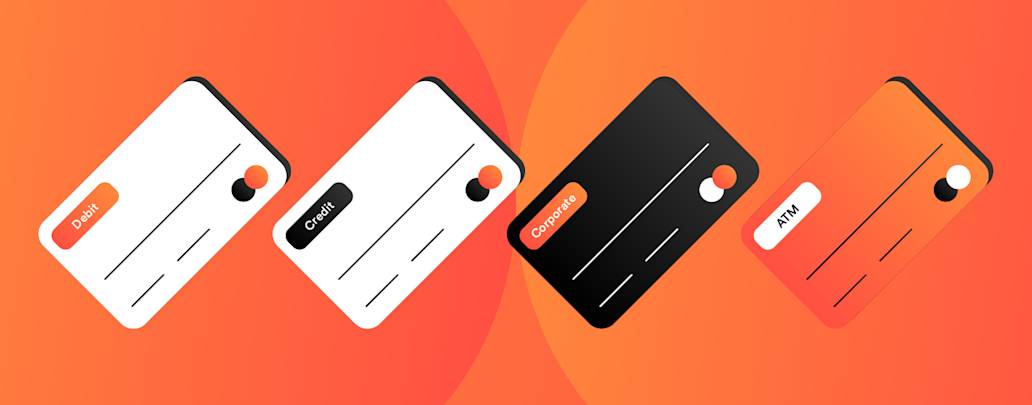Understanding the difference between corporate debit and credit cards

Kirstie Lau
Brand Content Marketing Manager

When it comes to corporate expenses and employee spending, having a company card can greatly streamline day-to-day operations. Among the various payment options available, the use of debit cards and prepaid cards has become increasingly common, with Visa and Mastercard being favored by consumers for their global acceptance and security. Moreover, many company cards now offer cashback benefits so you can enjoy rebates on your purchases. But which option should you choose for your company? In this article, we will explore the differences between these two types of cards and highlight the respective benefits they offer as company cards.
International card issuers: Visa, Mastercard, UnionPay
There are six major international card issuers in the market, namely Visa, Mastercard, UnionPay, American Express, JCB, and Discovery. These card issuers typically do not directly issue credit cards (except for American Express), but rather provide payment system services and collaborate with banks and other financial institutions to launch credit cards.
In Hong Kong, the most prevalent credit cards are from Visa, Mastercard, and UnionPay. Each card issuer has its own fees (such as foreign currency transaction fees), exchange rates, and their acceptance may vary across different merchants. In general, Visa cards are more common in the United States, Australia, and Asia, while Mastercards are primarily used in Europe and North America. Meanwhile, UnionPay cards are more widely circulated in Asia.
Visa
Visa is the world’s largest card issuing organization. They partner with approximately 15,000 financial institutions and governments to provide services in over 200 countries and regions worldwide. Visa card numbers typically begin with the digit "4".
In Hong Kong, Visa cards are available in different tiers, including Infinite, Signature, Platinum, and Gold. Among these tiers, Visa Infinite holds the highest status and is exclusively offered to invited individuals.
Mastercard
Mastercard, as the second-largest card issuing organization worldwide, operates in over 210 countries and regions. Mastercard card numbers usually begin with the digits "51" to "55", and similarly offer different tiers including World Elite, World, Platinum, Titanium, Gold, and Standard. Certain levels may have a specific eligibility criteria for income, and are exclusive for invited customers.
UnionPay
UnionPay is a financial institution established with approval from the People's Bank of China. Currently, UnionPay cards are accepted in 181 countries and regions worldwide, with cards starting with the digits "62" indicating their usability overseas. Tiers of UnionPay cards include Diamond Prestige, Diamond, Platinum, Gold, and Standard. The UnionPay Diamond Prestige cards are exclusively available to invited individuals.
What is a debit card?
A debit card is similar to a consumer card. It is linked to the user's designated bank account and funds are directly deducted from the bank account. Debit cards can be used for online and in-store purchases, and cash withdrawals as well. Visa and Mastercard debit cards are generally the same - you can use them both for direct payments for transactions or for withdrawing cash at ATMs.
What are the differences between a debit card and a credit card?
The difference between a debit and a credit card lies in the spending patterns. A credit card allows you to spend the “future money". Users make purchases with a predetermined credit limit provided by the bank, and the bank settles the payment with the merchant. The user then repays the bank for the card balance at the end of the month.
On the other hand, a debit card works on the principle of "spending what you have." Transactions and withdrawals can only be completed with sufficient funds in the linked bank account. If the balance is insufficient, the transaction cannot be processed.
The benefits of debit cards
Since a debit card deducts funds from the bank account instantly during the transaction, users do not accrue any outstanding balance with the bank, hence there is zero possibility of forgetting to settle the balance and no additional interest or fees are incurred. Additionally, a debit card allows users to limit their spending within the account balance, which effectively prevents excessive spending and reduces the risk of accumulating debt.
Which option is better as a corporate card?
Of all the payment options available, the use of debit cards and prepaid cards has become increasingly prevalent.
As many small and medium-sized enterprises may not meet the operational or revenue requirements to apply for a corporate credit card, the debit card is a great option. The minimum criteria is lower, usually requiring only a functioning company account. Additionally, many debit cards now offer cashback rewards that allow consumers to enjoy rebates while making purchases.
For companies that have overseas suppliers, a multi-currency corporate debit card can eliminate handling charges and currency exchange costs. It allows payments in over a hundred currencies, and you can exchange foreign currency at real-time exchange rates during transactions. You can also store the foreign currency in a foreign currency account for future use, allowing you to exchange at favorable rates and effectively manage currency risks.
Furthermore, companies have the option to apply for debit cards for their employees to facilitate procurement or business trips.
Airwallex Borderless Card
The Airwallex Borderless Card is a corporate card that supports over 140 currencies, as an alternative to debit and prepaid cards, without any foreign transaction fees or hidden charges. With this card, you can directly pay from your Airwallex multi-currency account for foreign currency transactions. In case the balance in your account is insufficient, the card allows for foreign exchange at competitive market rates.
Moreover, you have the option to issue multi-currency employee cards and set individual spending limits for each employee. The Airwallex Borderless Card is synchronized hourly with accounting software such as Xero, NetSuite, Sage, and Odoo. This integration enables real-time expense tracking, comprehensive budget management and simplified monthly reconciliation.
Virtual Visa card reduces the risk of fraud
The Airwallex Borderless Card is a virtual Visa card. It takes only a couple of minutes to set up your employee cards and corporate cards, and you can use it for online or in-store payment right away. Compared to physical cards, the risk of theft or loss is significantly reduced with virtual cards.
Additionally, you can monitor the expenditure details of each virtual card in real-time. If there are any large or unusual expenses, you can immediately freeze the card.
Employee Visa card enables setting spending limit for each employees
You can apply for up to 50 employee Visa cards free of charge and avoid the hassle and potential accounting confusion associated with sharing physical cards. This also simplifies the reimbursement process.
Furthermore, you can set different spending limits for each employee to help prevent unauthorized expenses. Limits include validity period (can be set to expire after a certain date), spending amount (daily, weekly, monthly, or yearly limits), spending frequency (single or multiple uses), approved merchants, and more.
Steps to applying for the Airwallex Borderless Card
Applying for the Airwallex Borderless Card is completely free. Once you have successfully opened an account with Airwallex, you can easily apply for corporate cards and employee cards in just a few minutes:
Open an Airwallex account
Choose whether to apply for a corporate card or an employee card
Specify the purpose, name, and spending limit for the card
The set up is completed. You can start using the card right away.
View this article in another region:Hong Kong SAR - 繁體中文

Kirstie Lau
Brand Content Marketing Manager
Kirstie Lau is a fintech writer at Airwallex, and has built up a wealth of knowledge in financial operations systems. In her day-to-day, she dedicates herself to crafting content that fits the unique needs of businesses seeking financial operations solutions. Kirstie’s background in analytics and product marketing gives her a unique perspective on guiding businesses through the complex world of payments.
Posted in:
Corporate cards

